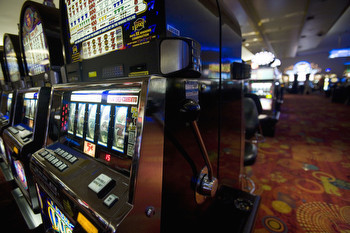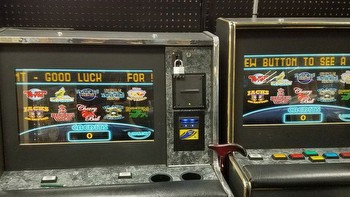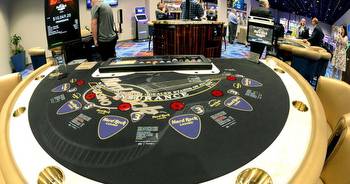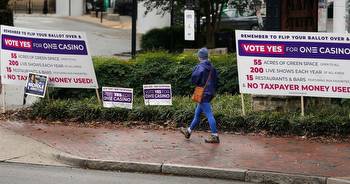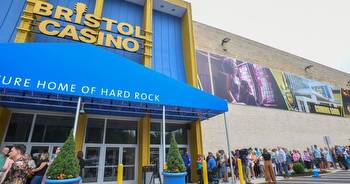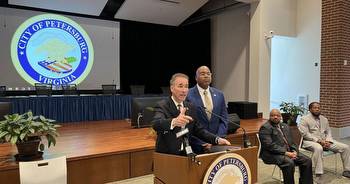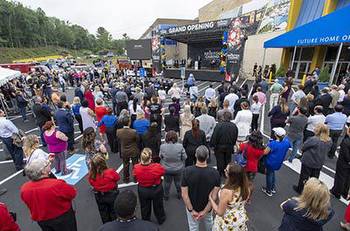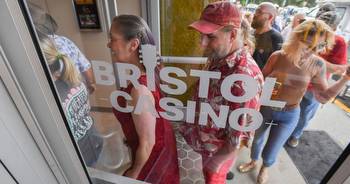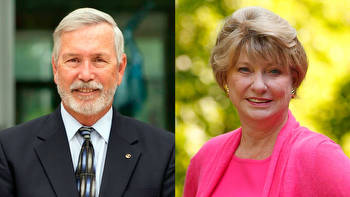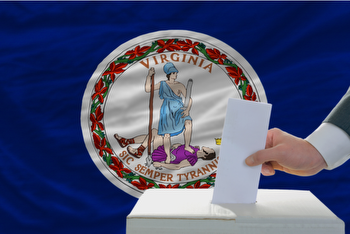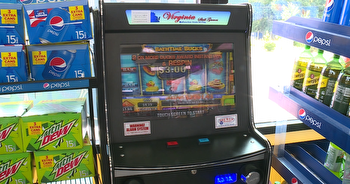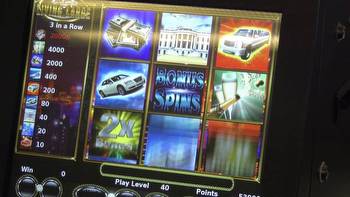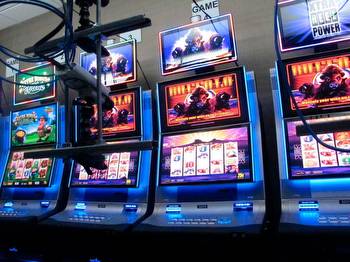Sadler seeks skill games reprieve, legalization
Former NASCAR driver Hermie Sadler, whose cars were once sponsored by Virginia tourism and the state lottery, remains embroiled in a protracted legal fight with state leaders over skill games.
Sadler filed a June 2021 lawsuit challenging the state’s ban on skills games, so-called “gray” machines, which he claims should be legalized and taxed much like the slot machines at the Bristol Casino. Sadler offers the machines for patrons of his many businesses in Southside Virginia.
“The bottom line is we’ve operated some form of a skill game at some of our locations since the mid-1980s. They’ve changed over the years with technology, but we’ve operated the games – mostly at our truck stops but at some of our convenience stores – for as long as I can remember. It’s never been an issue until the casinos started to plan their entry into the Commonwealth of Virginia,” Sadler said last week.
“You’ve got Rosie’s expanding, you’ve got the casinos coming in, you’ve got sports betting, online gaming that Virginia – all of a sudden – decided to open the floodgates on. The casino people want a monopoly and started to lobby the General Assembly to get rid of all the skill games so everyone has to go to the casinos to play the games,” Sadler claims.
The General Assembly voted to ban the games in 2020 but gave a one-year reprieve – until July 2021 – due to COVID-19. The ban went into effect July 2021. Sadler filed the lawsuit in June 2021 in Greensville County Circuit Court and court injunctions in December 2021 and a renewed injunction last month offer new life to the games which appear in restaurants, bars, convenience stores, truck stops and other businesses.
“I am not just advocating for skill games and I am not, at all, advocating against casinos,” Sadler said. “I am advocating for the free market system ... I think everybody should be treated fairly, the government should not be picking winners and losers as to who gets to operate and what type of business. I don’t think monopolies, especially enabled by the government, set a good precedent for people that run any kind of small business.
“And I think people should decide where they spend their money,” Sadler continued. “If they decide to play games, they should be able to decide, for instance, do they want to go to the casino in Bristol and play or should they be able to go to another establishment that legally operates skill games? The government is trying to take that away and that is a bad precedent.”
Last month, Sadler announced his candidacy for the newly redrawn state Senate district 17.
The four approved casinos are required to invest heavily in Virginia. Under the legislation authorizing casinos approved by voters, each casino is required to pay $15 million for a license with a 10-year term, but each license must be reviewed and renewed annually to determine if the operator has complied with the state laws and regulations. After 10 years the renewal fee is another $15 million.
Additionally, the law requires the casino developer to invest a minimum of $300 million in the facility. Estimates for Virginia’s four approved casino sites include $500 million for Bristol, $300 for the Rivers Casino Portsmouth which opens next month, $500 million for Headwaters Casino in Norfolk and $650 million for Caesar’s Virginia.
Of the Virginia projects, Bristol features a local ownership component. The Bristol Casino and its successor the Hard Rock Hotel & Casino Bristol will be jointly owned by Bristol’s Jim McGlothlin and Clyde Stacy, in conjunction with Hard Rock International, which is based in Florida and owned by the Seminole Tribe.
The Danville Casino will be owned by Caesar’s Entertainment, based in Las Vegas and managed by the Eastern Band of Cherokee Indians, based in Cherokee, North Carolina.
Portsmouth will be run by Rush Street Gaming, based in suburban Chicago and the Norfolk casino will be run by the Pamunkey Indian Tribe of Virginia.
Casino operators are also responsible for paying for extensive background checks of its management personnel and employees who would be involved in any aspect of the gaming process.
In addition to the casinos being built in Bristol, Danville, Norfolk and Portsmouth, the state allows one firm to operate slots-like games based on the results of historic horse racing. But the player who sits down encounters a gaming video screen and electronic interface; there is no grainy video of a past horse race but a game of chance which is approved by the state with tax revenues supporting the state’s horse racing and equine interests.
That operator, Rosie’s, is currently building a new facility in Sadler’s hometown of Emporia that will feature those machines. The future Rosie’s site is across the parking lot from one of Sadler’s convenience stores.
“The government is saying you can’t go to Hermie Sadler’s convenience store and play the two games he’s got in his place, but you can walk 100 yards out the back door and go to Rosie’s and play,” he said. “I’ve also got restaurants. The government says ‘you’ve got to go to Rosie’s.’ So while you’re there you’ll not only play their games, you’ll eat at their restaurant or drink a beer at their bar.”
Sadler said the current economic environment is putting pressure on all businesses, especially small businesses that operate on more narrow margins.
“In this business climate we’re in, every dollar matters. We’re seeing unprecedented costs for goods and services – up 30% and 40%. In the climate we’re in, I’m paying an average of $5 an hour more now for an average, hourly employee than three years ago and getting a less qualified employee,” Sadler said. “We have a lot of challenges. I’m not going to say that the revenue is insignificant.
“If they took skill games away from me, would I stay in business? Yes. But there are a lot of small business owners – the older couple that runs one store in rural Virginia or owner of a restaurant, bar or tavern, that $300 or $400 per month revenue off that machine – plus the money that’s generated by food and beverage sales – is not only important, in some cases its critical,” Sadler said. “It’s not the right time for the government to come in, take that part of your business even though you’ve done nothing wrong and give it to somebody else.”
“Our General Assembly was in such a hurry to ban these games, I don’t think they spent one minute considering what was going to happen,” Sadler said. “With no regulation and no oversight, every Tom, Dick and Harry in the world – especially those who don’t want to obey the law anyway – are putting games in vape shops, in backrooms. They’re even putting them in the back of tractor-trailers and running them around the state.
“The casinos want to represent that the backroom with 25 games are the skill game people; the ones causing all these problems. Those games in those type places are not the same games that we have. In most cases they are games of chance,” Sadler said. “Our games have a skill element that determines how successful a player can be. They’re not the same games.”
Sadler claims when the state’s one-year period allowing and taxing skill games ended, that is what opened the door for these games and prompted establishing “game rooms, shops and parlors” across Virginia.
“We want those places closed down just as much as the casinos do. The illegal operators are the only real enemy of us all,” Sadler said. “What I hope will happen is eventually the General Assembly works out a fair and equitable tax and regulation program for our games to be in our stores with ABC licenses – properly taxed and regulated.
“The skill game operators, the small businesses, the casinos, Rosie’s actually need to work together to put together a task force to eliminate and close down the businesses that are operating illegally,” Sadler said. “I didn’t create that problem by my lawsuit. The Commonwealth of Virginia, by signing SB 971, when the games went dark they took away all oversight. There is so much confusion about the law and nobody providing oversight these people are taking advantage of a vacuum right now to operate illegal games.”
Sadler said the injunction only covers the roughly 9,000 games that were identified by ABC and taxed by the state from 2020 to 2021.
“I don’t think our government ever thought what was going to happen when they took away the games and, more importantly, took away the oversight,” Sadler said. “Now we’ve got the wild, wild west. Our places are properly staffed, properly lit…we don’t want to be wrongly associated with people that are not doing it legally.”








